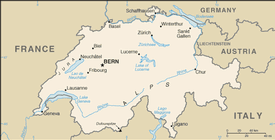Switzerland

About the Flag
Switzerland, a confederation located in central Europe, was granted a status of neutrality at the 1815 Vienna Congress, a guarantee that has never been broken. The Alps and Jura mountains cover 70% of the Swiss territory. The executive branch is constituted by a collegial government of seven Ministers, one of which becomes in turn the Chief of State and Head of Government for a year. The legislative power is constituted by a bicameral Federal Assembly. The legal system is based on civil law and was initially influenced by the laws of France and Germany. The capital of Switzerland is Bern. German, French, Italian, and Romansch are the four official languages.
Switzerland’s economy is one of the most prosperous in the world. Stable political, economic, and social conditions have combined to create a major banking and finance centre. Traditions of discretion and banking secrecy have also strengthened this attraction. High technology equipment, precision instruments, and machinery are the main exports. Additionally, the spectacular natural beauty and renowned peacefulness of the Swiss countryside sustain a substantial tourism industry. The main commercial partner is the European Union. The currency is the Swiss franc, and the most important business centers are Zurich, Geneva and Basel.
Switzerland has a maritime fleet that is the responsibility of the Swiss Maritime Navigation Office (SMNO) which in turn is part of the Federal Department of Foreign Affairs (FDFA). The SMNO also keeps a register of all Swiss sea-going yachts and small craft.

